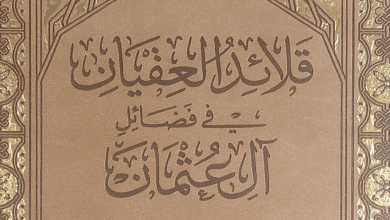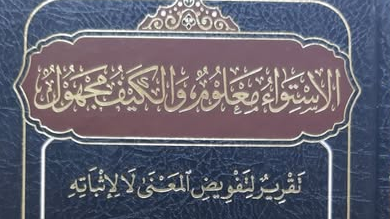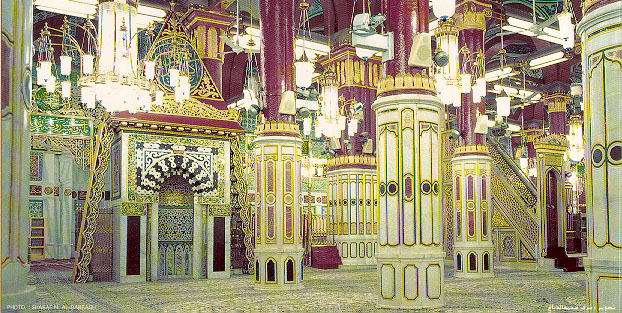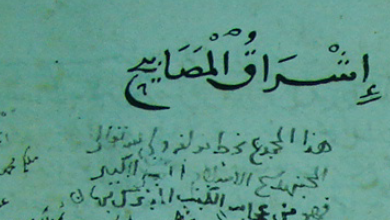The Foundations of the Sunna Attributed to Imām Aḥmad: Weak (ḍaʿīf) chain of transmission, not authentic
أصول السنة المنسوب للإمام أحمد
ضعيف الإسناد لا يصح
The Foundations of the Sunna (Usul al-Sunna) Attributed to Imām Aḥmad:
Weak (ḍaʿīf) chain of transmission, not authentic
مع أنه لا يخالف أهل السنة والجماعة الأشاعرة والماتريدية أتباع السلف الصالح إلا في نقل كون اللفظ في القرآن بدعة عن الإمام أحمد – رحمه الله – إلا أن راويه المنقري ضعيف كما قال المحقق.
Although it does not contradict Ahl al-Sunna wa al-Jamāʿah, the Ashʿarīs and Māturīdīs who follow the righteous predecessors (Salafus-Sālih), except in transmitting that the utterance in the Qur’an is an innovation from Imām Aḥmad – may Allah have mercy on him – however, its narrator al-Minqarī is weak, as stated by the editor.[i]
الشيخ محمود يزبك
أبو عبد الرحمن
التَّرْجَمَة مَعَ الحَوَاشِي بِقَلَم:
أَبِي الحَسَن حُسَيْن أَحْمَد (darultahqiq.com)
الكتاب من رواية عبدوس بن مالك – تحقيق د. محمد هشام طاهري
(Written by): Shaykh Maḥmūd Yazbak Abū ʿAbd al-Raḥmān[ii]
Translation with footnotes by:
Abul Hasan Hussain Ahmed (darultahqiq.com)
The book from the narration of ʿAbdūs ibn Mālik[iii] – edited by Dr. Muḥammad Hishām Ṭāhirī:
-1 في سند الكتاب محمد بن سليمان المنقري، وهو ضعيف، وكان يقلب الأخبار على الثقات !!، قال ابن حبان: يقلب الأخبار على الثقات، ويأتي عن الضعفاء بالملزقات، لا يحل الاحتجاج به بحال» .. كتاب المجروحين من المحدثين لابن حبان – 328/2]
1- In the chain of transmission of the book is Muḥammad ibn Sulaymān al-Minqarī, who is weak and would alter reports from reliable narrators!! Ibn Ḥibbān[iv] said: “He alters reports from reliable narrators and brings fabricated reports from weak narrators. It is not permissible to use him as evidence under any circumstances.” [Kitāb al-Majrūḥīn min al-Muḥaddithīn by Ibn Ḥibbān – 2/328]
وذكره ابن الجوزي في الضعفاء والمتروكين.
فهذا هو المنقري، يقلب الأخبار على الثقات ويأتي بالملزقات !!.
Ibn al-Jawzī mentioned him in [his book of] weak and abandoned narrators.[v]
This is al-Minqarī, who alters reports from reliable narrators and brings fabrications!!
-2- وأيضا ثالث رجال الإسناد وهو ابن البناء الحسن بن احمد البغدادي الحنبلي: مختلط
وانظر ماذا قال عنه الذهبي: وكتب الكثير، وتصانيفه تدل على قلة فهمه، كان يصحف، وكان قليل التحصيل، أقرأ، وحدث، ودرس وأفتى، وشرح (الإيضاح) لأبي علي الفارسي، وإذا نظرت في كلامه، بان لك سوء تصرفه، ورأيت له ترتيبا في (الغريب) لأبي
عبيد، قد خبط وصحف». سير أعلام النبلاء – 381/18]
2- Also, the third man in the chain of transmission is Ibn al-Bannā’ al-Ḥasan ibn Aḥmad al-Baghdādī al-Ḥanbalī: confused in narration.
Look at what al-Dhahabī[vi] said about him: “He wrote extensively, but his works indicate his lack of understanding. He would make errors in transmission, had little scholarly attainment, though he taught, narrated, gave lessons and issued legal opinions, and wrote a commentary on al-Īḍāḥ by Abū ʿAlī al-Fārisī. When you look at his words, his poor handling becomes clear to you. I saw his arrangement of al-Gharīb by Abū ʿUbayd, which contained errors and misreadings.” [Siyar Aʿlām al-Nubalā’ – 18/381]
يعني العقيدة مروية عن ضعيف ومختلط، فهي لا تصح من ناحية، لكن قالوا رواها متفرقة اللالكائي – رحمه الله ، وهذه طريقة جديدة في توثيق الكتب، فإن كان السند
ضعيفا فلا يضر !!، هذا هو حاصل ترقيع الوهابي.
This means the creed is narrated from someone weak and someone confused in narration, so it is not authentic from one perspective, but they say al-Lālakā’ī – may Allah have mercy on him – narrated it in separate parts, and this is a new method in authenticating books, [suggesting] that if the chain is weak it doesn’t matter!! This is the result of Wahhābī patchwork.
واللالكائي أيضا ينقلها عن المنقري، والذي اعترف بضعفه عطية الزهراني، وهو أستاذ ابو يعقوب المصري محقق كتاب أصول السنة كما في الحاشية. [راجع التحقيق 254]
And al-Lālakā’ī also narrates it from al-Minqarī, whose weakness was acknowledged by ʿAṭiyyah al-Zahrānī, who is the teacher of Abū Yaʿqūb al-Miṣrī, the editor of the book Uṣūl al-Sunna, as mentioned in the footnote. [See the critical edition p. 254]
فالكتاب لا يصح سندا لوجود ضعيف ومختلط به !!
(Conclusion): The book is not authentic in its chain of transmission due to the presence of someone weak and someone confused in narration!!
تعليق إنفوجرافيك سنة:
-1- يجن جنون الوهابية حينما نكشف ضعف وانقطاع ووضع كتبهم، لأنها تمس عصب هذا الفكر البائس المشؤوم الذي لا يقوم إلا على القيل والقال حينما
انقطعت أسانيدهم عن علوم الأمة !
Sunna Infographic Commentary:
1- The Wahhābīs become furious when we expose the weakness, disconnection, and fabrication in their books, because this touches the nerve of this miserable, ill-fated ideology which only stands on hearsay since their chains of transmission have been cut off from the knowledge of the Ummah!
2 أمثال هذه الكتب لا يعتمد عليها أصالة على اعتقاد الإمام أحمد، والعبرة في عقيدة الإمام أحمد هو المعتمد عند أئمة الحنابلة أهل التنزيه، لأنهم أهل الإسناد المتصل به رواية ودراية، وهم قد كفونا مؤنة كشف من تدثر بالإمام أحمد
ليمرروا عقائد التجسيم والحشو.
2- Books like these cannot be relied upon primarily for the belief of Imām Aḥmad, and what matters regarding Imām Aḥmad’s creed is what is relied upon by the Ḥanbalī Imams who affirm transcendence [tanzīh], because they are the people of connected chains of transmission to him in both narration and understanding, and they have spared us the burden of exposing those who wrap themselves in Imām Aḥmad’s name to pass on anthropomorphist [mujassima] beliefs and interpolations.
Original Sunna Infographic poster:
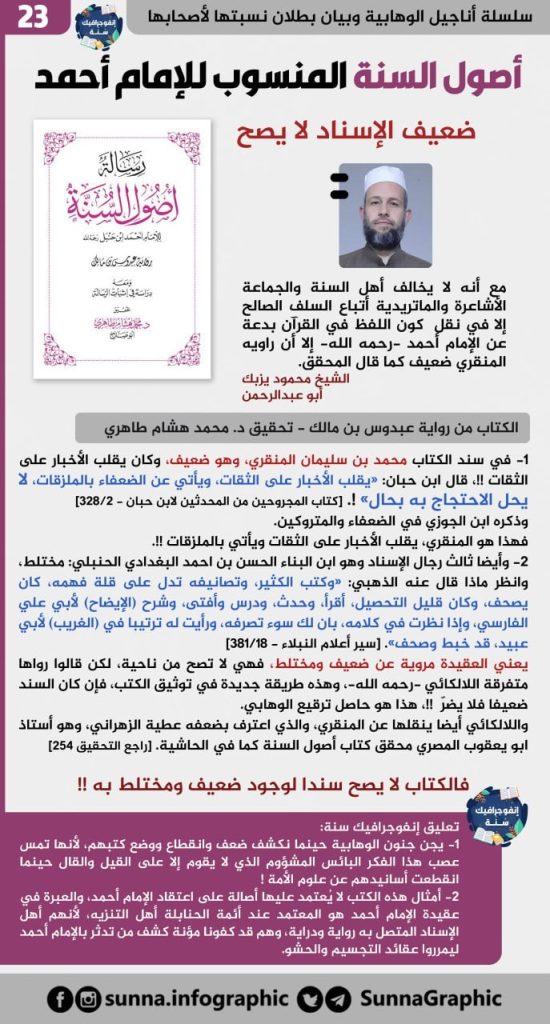
[i] It was translated by Salafis in the UK under the title: Foundations Of The Sunnah, where they also failed to mention the status of the narrators in the chain of transmission.
[ii] His background details were mentioned by himself in Arabic and here is a summary of what he mentioned:
Maḥmūd Zakī Yazbak (Abū ʿAbd al-Raḥmān) is a Shāfiʿī scholar born in Damascus, Syria in 1985 who follows the Ashʿarī school of theology. His educational journey began in 2000 at the Institute of Shaykh Badr al-Dīn al-Ḥasanī (formerly al-Amīniyyah), where he studied various Islamic sciences.
He studied under numerous scholars, including specialists in each field. He later enrolled at Damascus University, graduating from the History Department in 2011. Due to circumstances, he was forced to emigrate and temporarily pause his religious studies. In 2015, he resumed his Islamic studies under Shaykh ʿAbdullāh Idrīs al-Khalīlī, focusing particularly on the Ashʿarī creed.
[iii] His biography is mentioned in the Ṭabaqāt al-Ḥanābila (1/241 – https://app.turath.io/book/9543?page=243) of Ibn Abī Yaʿlā where he mentioned in the beginning of his entry the following:
عبدوس بن مالك أبو محمد العطار،
ذكره أبو بكر الخلال، فقال:
كانت له عند أبى عبد الله منزلة فى هدايا وغير ذلك، وله به أنس شديد. وكان يقدمه. وله أخبار يطول شرحها. وقد روى عن أبى عبد الله مسائل لم يروها غيره، ولم تقع إلينا كلها. مات ولم تتخرج عنه ووقع إلينا منها شئ، أخرجه أبو عبد الله فى جماع أبواب السنة، ما لو رحل رجل إلى الصين فى طلبها لكان قليلا.
أخرجه أبو عبد الله، ودفعه إليه
Meaning:
“ʿAbdūs ibn Mālik Abū Muḥammad al-ʿAṭṭār – Abū Bakr al-Khallāl mentioned him, saying: He had a special status with Abū ʿAbdullāh regarding gifts and other matters, and had a strong familiarity with him. He [Abū ʿAbdullāh] would give him precedence. He has reports that would take long to explain. He narrated issues from Abū ʿAbdullāh that no one else narrated, and not all of them have reached us. He died before they were all transmitted from him, though some of them reached us, which Abū ʿAbdullāh included in his compilation of chapters on the Sunnah – matters for which if a person were to travel to China seeking them, it would be considered little. Abū ʿAbdullāh produced it and handed it to him.”
Also al-Khaṭīb al-Baghdādī mentioned the following in his Tārīkh Baghdād (12/417 – https://app.turath.io/book/736?page=6498) under his entry:
حدثت عن عبد العزيز بن جعفر الحنبلي، قال: أَخْبَرَنَا أبو بكر الخلال، قال: وعبدوس بن مالك العطار كانت له عند أبي عبد الله يعني أحمد بن حنبل منزلة
I was informed about ʿAbd al-ʿAzīz ibn Jaʿfar al-Ḥanbalī, who said: Abū Bakr al-Khallāl informed us, saying: And ʿAbdūs ibn Mālik al-ʿAṭṭār had a special status with Abū ʿAbdullāh, meaning Aḥmad ibn Ḥanbal.
وأَخْبَرَنِي الحسن بن صالح العطار، قال: حَدَّثَنَا هارون بن يعقوب الهاشمي، قال: سمعت أبي أنه سأل أبا عبد الله عن عبدوس العطار، فقال: أكتب عنه؟ قال: نعم، اكتب عنه
And al-Ḥasan ibn Ṣāliḥ al-ʿAṭṭār informed me, saying: Hārūn ibn Yaʿqūb al-Hāshimī narrated to us, saying: I heard my father asking Abū ʿAbdullāh about ʿAbdūs al-ʿAṭṭār, saying: “Should I write from him?” He replied: “Yes, write from him.”
[iv] The full quote from Ibn Hibban’s Kitāb al-Majrūḥīn is available here – https://app.turath.io/book/5834?page=593
Quote with translation:
مُحَمَّد بن سُلَيْمَان الْجَوْهَرِي من أهل الْبَصْرَة سكن أنطاكية يروي عَن أبي الْوَلِيد الحوضي وَأهل الْبَصْرَة يقلب الْأَخْبَار على الثِّقَات وَيَأْتِي عَن الضُّعَفَاء بالملزقات لَا يحل الِاحْتِجَاج بِهِ بِحَال
Muḥammad ibn Sulaymān al-Jawharī, from the people of al-Baṣra who settled in Anṭākiyah, narrates from Abū al-Walīd al-Ḥawḍī and the people of al-Baṣra. He alters reports from reliable narrators [thiqāt] and brings fabrications from the weak narrators [ḍuʿafā’]. It is not permissible to use him as evidence under any circumstances.
رَوَى عَنْ حَفْصِ بْنِ عُمَرَ الْحَوْضِيِّ قَالَ حَدَّثَنَا شُعْبَةُ عَنْ قَتَادَةَ عَنْ أَنَسِ بْنِ مَالِكٍ أَنَّ النَّبِيَّ ﷺ مَرَّ عَلَى صِبْيَانٍ فَسَلَّمَ عَلَيْهِمْ
He narrated from Ḥafṣ ibn ʿUmar al-Ḥawḍī who said: Shuʿba narrated to us from Qatādah from Anas ibn Mālik that the Prophet ﷺ passed by some children and greeted them.
وَرَوَى عَنْ عَبْدِ اللَّهِ بْنِ عَمْرٍو الْوَاقِفِيِّ قَالَ حَدَّثَنَا أَيُّوبُ بْنُ عُتْبَةَ عَنْ إِيَاسِ بْنِ سَلَمَةَ بْنِ الأَكْوَعِ عَنْ أَبِيهِ أَنَّ النَّبِي ﷺ قَالَ خَرَجَ ثَلاثَةٌ كَانَ قَبْلَكُمْ وَذَكَرَ حَدِيثَ الْغَارِ بِطُولِهِ
And he narrated from ʿAbdullāh ibn ʿAmr al-Wāqifī who said: Ayyūb ibn ʿUtbah narrated to us from Iyās ibn Salamah ibn al-Akwaʿ from his father that the Prophet ﷺ said: “Three people who were before you went out,” and he mentioned the long ḥadīth of the cave.
أَخْبَرَنَا بِالْحَدِيثَيْنِ جَمِيعًا مُحَمَّدُ بْنُ أَحْمَدَ بْنِ الْمُسْتَنِيرِ بِالْمِصِّيصَةِ قَالَ حَدَّثَنَا مُحَمَّدُ بْنُ سُلَيْمَانَ الْجَوْهَرِيُّ فِي أَشْيَاءَ كَتَبْنَاهَا عَنْهُ مَقْلُوبَةٍ أَكْرَهُ ذكرهَا كَرَاهِيَة التَّطْوِيل
Muḥammad ibn Aḥmad ibn al-Mustanīr in al-Miṣṣīṣah informed us of both ḥadīths, saying: Muḥammad ibn Sulaymān al-Jawharī narrated to us among other things we wrote from him that were altered, which I dislike mentioning to avoid lengthiness.
[v] 3/67
[vi] Al-Dhahabi quoted this from Ibn al-Najjar (see here – https://app.turath.io/book/22669?page=7073)
Download as a PDF – HERE


